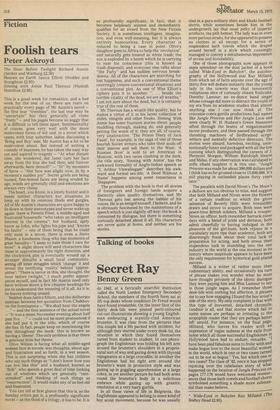Talking of books
Secret Ray
Benny Green
• In 1942, at a farcically anarchic institution called the North London Emergency Secondary School, the members of the fourth form sat at lift-top desks whose condition Dr Freud would have found irresistible. On the inner face of the thirty desk-lids were pinned parti-coloured cut-out illustrations showing a young Englishman embracing a scantily-clad American brunette. It was clear from the pictures that this couple led a life packed with incident, for although they starred under every desk-lid, the situation in which they found themselves varied from student to student. In one photograph the Englishman was holding his left arm around the brunette's shoulders in a proprietorial sort of way and gazing down with thyroid repugnance at a large crocodile; in another the Englishman had his right arm around the brunette's waist in protective style and was gazing up in goggling apprehension at a large cobra; in yet another picture he had both arms round the brunette's body in a solicitous embrace while gazing up with granitic resolution at a very hairy gorilla.
In all these views of life in Belgravia, the Englishman appeared to belong to some kind of boy scout movement, because he was usually clad in a para-military shirt and khaki football shorts, while sometimes beside him in the undergrowth lay that most pithy of imperial artefacts, the pith helmet. The lady was in even more parlous straits, for she appeared to possess no clothes at all except tor a series of resplendent bath towels which she draped around herself in a style which cunningly managed to convey a simultaneous impression of access and inviolability.
One of those photographs now appears in sepia splendour on the dust jacket of a book called Wide-Eyed in Babylon*, the autobiography of the Hollywood star Ray Milland, from which set of facts anyone over the age of
thirty-five will deduce instantly that the young lady in the towels was that innocently voluptuous slice of curiously chaste fruitcake, Dorothy Lamour; an ex-dance band singer whose corsage did more to distract the youth of my era from its academic studies than almost anything else I can now think of. The crocodile-cobra-gorilla productions had names like Jungle Princess and Her Jungle Love and were clearly W. H. Hudson's Green Mansions sifted through the brains of megalomaniac movie producers, and then passed through the threshing machines of birdbrained script writers and mentally defective directors. The stories were absurd, harmless, exciting, unin tentionally funny and packaged with all the low cunning which distinguished the careers of J. Pierpoint Morgan, William Randolph Hearst and Midas. If any observation was calculated to stifle ribald laughter it is this one: "Jungle Princess was made for about 300,000 dollars and I think has so far grossed close to 15,000,000. It's still playing in outlandish places forty years later."
The parallels with David Niven's The Moon's a Balloon are too obvious to miss, and suggest that both Milland and Niven were the flowers of a certain tradition to which the glove salesmen of Beverly Hills were irresistibly drawn and strove to acquire. Both men were peace-time British soliders, Milland a trooper, Niven an officer, both remember barrack-room days with a blend of pride and derision, both admit cheerfully to having indulged in the pleasures of the girl-hunt, both rejoice in a vocabulary more ripe than academic, both are disarmingly frank about their total lack of preparation for acting, and both stress their stupendous luck in stumbling into the one industry in the world at the one moment in its history where ineptitude appears to have been the only requirement for hysterical gold-plated success.
Milland is a writer of rather more than rudimentary ability, and occasionally his turn of phrase makes you wonder what he must have thought privately of the idiotic dialogue they were paying him and Miss Lamour to say in those jungle sagas. As I remember those desk-lids with nothing but affection, it pleases me to say how engaging I found the boy scout's side of the story. My only complaint is that with this type of irreverent, detached chronicle, candour is all, and that stories which fail to name names are perhaps so irritating to the scopophile reader that they are perhaps better left untold. For instance, on the final page,
Milland, who leaves his reader with an impression of vague sadness at the exile from home which all those successful Englishmen 1,r1 Hollywood have had to endure, remarks, I have been paid fabulous sums to frolic with and make bogus love to the most beautiful women in the world, which in one or two cases turned out to be not so bogus." Yes, but which one or two cases? The class of '42, once it has stopped rejoicing over the rabelasian story of what happened on the location of Jungle Princess on pages 177-178 would have welcomed reassurances that those bath towels and football shorts symbolised something a shade more substantial than make-believe.
* Wide-Eyed in Babylon Ray Milland (The Bodley Head £2.95)


































 Previous page
Previous page